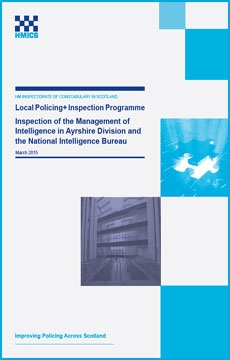Our approach to Local Policing+ inspections provides an opportunity to assess the quality of local policing across Scotland and enables us to publicly report on how Police Scotland is delivering against local priorities and keeping people safe. On this occasion we inspected Ayrshire Division which is subject of a separate report. Our findings have been published and are available on our HMICS website.
Our Local Policing+ inspection programme, which forms part of our published scrutiny plan, provides sufficient flexibility to scrutinise new and emerging issues affecting policing in Scotland. These issues are identified through a process of stakeholder engagement and informed by our scrutiny risk assessment which highlights areas of local or national significance.
In this instance, we identified that Police Scotland had carried out a national review of the 14 Divisional Intelligence Unit (DIU) structures. As the Ayrshire Divisional Intelligence Unit was used as a broad template for the future design of local intelligence, it was an opportune moment to assess the state, effectiveness and efficiency of:
- the Divisional Intelligence Unit (Ayrshire Division) and synergy with Intelligence Support, Specialist Crime Division; and
- the role of the National Intelligence Bureau (NIB), in the provision of specialist support, quality audit of the local intelligence function and maintenance of national standards.
In recognition of the role undertaken by Divisional Intelligence Units and the National Intelligence Bureau in the management of serious organised crime groups (SOCG) the inspection scope was extended to include serious organised crime group mapping (SOCGM).
Number | Recommendation |
|---|---|
1 | Police Scotland should continue to engage in UK level dialogue with the National Crime Agency (NCA) and key contributors of serious organised crime group mapping to collaboratively design a common model which meets the future needs of policing and law enforcement. |
2 | Police Scotland should review the existing intelligence portfolio including governance, structures and processes and consider realignment of existing Divisional Intelligence structures under the direction and control of the Detective Chief Superintendent (Intelligence Support), providing clear and transparent ownership, accountability and co-ordination of all intelligence assets and people within Specialist Crime Division and Divisions. |
3 | Police Scotland should develop structures, systems and processes for co-ordination of all available information and intelligence which provides an authoritative view of intelligence aligned to the national policing priorities which informs prevention, intelligence, enforcement and reassurance responses. |


